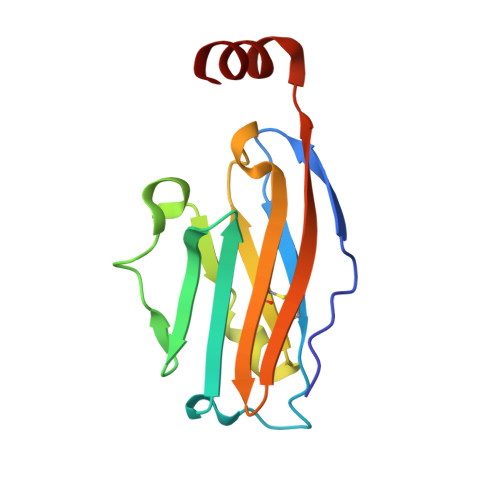Discovery of Novel PD-L1 Small-Molecular Inhibitors with Potent In Vivo Anti-tumor Immune Activity.
Liu, L., Zhang, H., Hou, J., Zhang, Y., Wang, L., Wang, S., Yao, Z., Xie, T., Wen, X., Xu, Q., Dai, L., Feng, Z., Zhang, P., Wu, Y., Sun, H., Liu, J., Yuan, H.(2024) J Med Chem 67: 4977-4997
- PubMed: 38465588
- DOI: https://doi.org/10.1021/acs.jmedchem.4c00102
- Primary Citation of Related Structures:
8XR5 - PubMed Abstract:
Programmed death-ligand 1 (PD-L1) has surfaced as a promising therapeutic target for various cancers due to its pivotal role in facilitating tumor immune evasion. Herein, we report a series of novel small-molecule PD-L1 inhibitors exhibiting remarkable inhibitory activity against the PD-1/PD-L1 interaction ( X18 : IC 50 = 1.3 nM) and reinstating the suppressive effect of PD-L1 on T cells ( X18 : EC 50 = 152.8 nM). Crystallographic studies revealed the binding mode of X18 and PD-L1. Through a rational prodrug design approach, we have successfully optimized the oral pharmacokinetic properties of X22 , effectively addressing the poor oral pharmacokinetic profile of PD-L1 small-molecule inhibitors. Notably, X22 demonstrated significant antitumor efficacy in murine models of MC38 and CT26 colon cancer through the upregulation of tumor infiltration and cytotoxicity of CD8 + T cells partially. These findings offer promising prospects for the advancement of PD-L1 inhibitors as innovative agents in cancer immunotherapy.
Organizational Affiliation:
Jiangsu Key Laboratory of Drug Discovery for Metabolic Disease, State Key Laboratory of Natural Medicines, China Pharmaceutical University, Nanjing 210009, China.

















